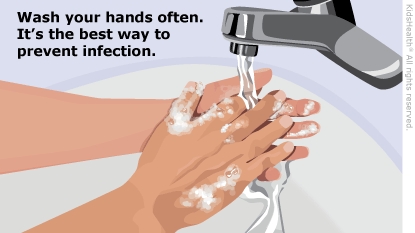Neutropenia (new-truh-PEE-nee-uh) means that the body doesn't have enough neutrophils. Neutrophils are a type of white blood cell that fight bacteria. Bacteria are germs that cause infections. Without enough neutrophils, serious infections can happen.
Your child had a fever and a low neutrophil count. The health care provider tested for infections and started antibiotics. They may also have given your child medicine to help the neutropenia get better. You can now care for your child at home.

Follow your health care provider's instructions for:
- Giving any medicines, including antibiotics. Don't stop antibiotics early, even if your child seems better. They need to finish all the doses to be sure the infection is fully treated.
- Whether it's OK to give acetaminophen (Tylenol® or a store brand) or ibuprofen (Advil®, Motrin®, or a store brand). Since these medicines can cover up a fever, your health care provider may not want you to give them.
- When to follow up.
When your child is neutropenic:
To prevent infections, follow any special instructions from your health care provider. In general, your child should:
- Avoid public places, including schools.
- Avoid sick people.
- Avoid sharing drinking glasses or utensils.
- Wear a face mask if they must go out.
- Wash hands well and often.
- Clean cuts right after an injury, then cover with a bandage.
- Not use razors. They make small cuts in the skin that can let germs into the body.
- Avoid certain foods, including unpasteurized dairy foods; raw honey; and raw fruits, vegetables, and nuts. There can be germs in these foods.
- Not have their temperature taken rectally (in the bottom). The thermometer can irritate the lining of the rectum which may let germs into the body. If your child needs their temperature checked, it should be with a oral (mouth), axillary (armpit), or temporal (forehead) thermometer.

Your child:
- Gets a fever, which means there is:
- A single temperature of 101°F (38.3°C) or higher
- A temperature of 100.4°F (38°C) or higher taken twice at least 1 hour apart
- Shows signs of infection, such as:
- Sweating, shaking, or chills
- Coughing
- Sores in the mouth
- Redness, swelling, or sores on the skin
- Diarrhea
- Pain or trouble peeing (urinating)
- Feeling sick or very tired
- Extreme fussiness in babies and younger children
Your health care provider may tell you to take your child to the ER for some of these symptoms.

Your child:
- Can't be awakened
- Has a seizure
Be sure to tell emergency responders your child has neutropenia.

What is ANC? ANC, or absolute neutrophil count, is the total number of neutrophils in a person's white blood cell count. Health care providers use this number to determine someone's risk of infection. Someone with a low ANC (less than 500) is more likely to get infections.
How can parents help a child with neutropenia? Neutropenia can be very stressful for kids and their families. Your health care provider and social worker can help you and your child, especially if your child is feeling sick or is lonely from having to stay away from other people to prevent infections.




